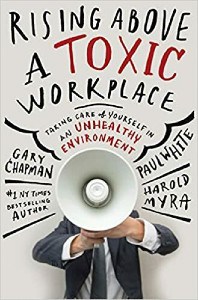Woman #1: Probably my worst job ever was counting lasagna noodles, like literally counting them and putting them in a box. So talk about mind numbing.
Man #1: I worked for a nonprofit that was losing money, and as a result, the boss turned into a maniac.
Woman #2: I had a male coworker tell me that because he was a man, he was in charge of me.
Man #2: I had a job where I had to cold call people and sell digital ads. And I was at that job for four months and I only sold one.
John Fuller: (laughing) Oh. Well, some jobs can be really challenging, and the boss might, uh, be demanding. You might not have the training you need. Coworkers aren’t cooperating. Or maybe you’re dealing with something much worse, a toxic work environment, and it’s driving you crazy. We’re gonna explore this topic further today on Focus on the Family, and your host is Focus president and author Jim Daly. I’m John Fuller.
Jim Daly: John, the truth is, no job is perfect. Guess why? No people are perfect.
John: Exactly.
Jim: And, uh, we have to remember that. I think generally, though, finding a place with low toxicity, both in the secular space, as well as the Christian space, a church, very similar, is kind of a goal I’ve always had.
John: Mm-hmm.
Jim: You know, “Is this a place where I can work and flourish and, and do the things God’s called me to do?” Thankfully, at Focus, I’ve always felt that way. They say, you know, find something you like to do, and you’ll never work a day in your life.
John: Mm-hmm.
Jim: I love that adage. But unfortunately, like anything, you have to mix with other people. And sometimes people bring a lot of baggage into the workplace. Sometimes that person can be your boss, and it becomes very difficult. And we’re gonna talk about this today with two great experts.
John: Yeah. We have, uh, Dr. Gary Chapman and Dr. Paul White with us. Uh, Dr. Chapman is a good friend. He’s been here a number of times, of course. An author, a speaker, a counselor, best known for his series of books called The Five Love Languages. And Dr. Paul White is a psychologist, author, and speaker, and, uh, together, uh, he and Dr. Chapman wrote a book that will kind of form the foundation of our conversation today. It’s called Rising Above a Toxic Workplace: Taking Care of Yourself in an Unhealthy Environment. And we’ve got details about our guests and the book at focusonthefamily.com/broadcast.
Jim: Dr. Chapman, Dr. White, welcome to Focus on the Family.
Dr. Paul White: Thank you.
Jim: (laughs)
Dr. Gary Chapman: Thank you. Glad to be here.
Jim: Doctor, doctor.
Dr. White: Yes.
Jim: Doctor. (laughs) No, it’s so good. And you guys worked hard for those degrees. Thank you very much for doing that. And you put your, um, you know, your learnings and your, your experiences into a great book here, Rising Above a Toxic Workplace. Let’s start with the definition of what that means. I’m trying to think back to, you know, work environments. I worked in college at Toys R Us one night.
Dr. White: Mm-hmm. One?
Dr. Chapman: One.
Jim: Signed up, got hired, went in at Christmas. What a place to work at Christmas. (laughs)
Dr. White: Oh. (laughs)
Jim: Where’s the Monopoly game? Where’s this? I’m sorry, I’m new. I don’t know where to get it from. (laughs).
Dr. White: Mm-hmm.
Jim: I’ve worked one night. I never went back for the check either. I said they could keep it.
Dr. White: (laughs)
Dr. Chapman: (Laughs)
Jim: So, I don’t know if that was toxic, but it definitely wasn’t comfortable.
Dr. White: Maybe the onboarding process wasn’t great, huh? So.
Jim: Here’s an apron. That was the onboarding process. So.
Dr. White: (laughs)
Dr. Chapman: (laughs)
Jim: So, yeah, be careful ’cause a lot of moms are looking for toys tonight. So, but define that, toxic environment.
Dr. White: Yeah, I think it’s especially important because toxic is used so much today, and I think probably overused. And, uh, when you think about toxic environments, I think that the easiest way to understand a toxic workplace is to think about a toxic physical environment. It’s unhealthy. It has poison. And it, it’s gonna damage you and maybe eventually kill you if you don’t take care of yourself and, and protect yourself and get out. And I think it’s different than an unhealthy workplace or maybe not a great boss kind of person.
Jim: Right.
Dr. White: That’s, you know, they’re trying, they just, they’re still learning. But a toxic workplace really over time you see that this is not healthy, it’s starting to affect my personal health, uh, sleep, relationships, my emotional health and something needs to change-
Jim: Yeah.
Dr. White: … or I’m not gonna go well.
Jim: So, in essence there’s degrees to unhealthy/toxic-
Dr. White: Sure.
Jim: …work environments. Some are mildly unhealthy to very toxic.
Dr. White: Yeah, because, I mean, most workplaces or, or work is not super enjoyable all the time. Right? And so there’s bad components and less than healthy, uh colleagues. So, you have that, but there’s a point at which it sort of goes over the, the cliff and really becomes-
Jim: Yeah.
Dr. White: … a bad place.
Jim: In fact, like so many good thoughts, uh, research can reinforce this. I think you had a reference in the book about a study with rabbits on a freeway.
Dr. White: Right.
Jim: Now I (laughs)- First of all, that doesn’t sound really good. I, I would say that would be toxic environment for the rabbit, but.
Dr. Chapman: (laughs)
Dr. White: (laughs)
Jim: How did the study come about?
Dr. White: Yeah. It was an interesting study that they, I, I don’t remember how they sort of came to it. But there was this group of rabbits that, um, wound up living in one of those little triangles in between-
Jim: The median.
Dr. White: Yeah. In between some freeways.
Jim: They did have it fenced off, I believe.
Dr. White: Uh, yes.
Jim: Yeah.
Jim: I heard. I think so. Just for the rabbit lovers.
Dr. White: Yes.
Jim: Yes.
Dr. White: But, uh, you know, fumes and noise and not a healthy place to live, but they lived there for a while.
Jim: Yeah, but it did affect them, right? It, it made them less healthy?
Dr. White: Sure.
Jim: Which is the point. When you have chaos, horns.
Dr. Chapman: I think the rabbits were saying to each other, “How can we get outta here?”
Jim: Yeah (laughs) okay. Like some employees might be saying. Which leads me to that. Uh, why does a person stay in a job that’s in that toxic category? Why would somebody suck it up and stick with it?
Dr. Chapman: I think often it’s because they need the money. They gotta feed the kids. You know, they gotta have the money. So they stay there. And consequently, it, it affects the kids. It affects the wife. It affects the whole family. So that’s not always the best decision to stay there just because of the money. But, uh, I understand it because if you don’t have another job, what are you gonna do? You know.
Jim: Right. Well, you- and it comes down to that dinner conversation between you and your spouse, I would think typically. Wow, work is just such a bummer, you know. It’s just, my boss is doing this, that, and the other thing. It, what can a spouse do to say, “You know, you’ve said that 14 times this week.” Which is probably an indicator, right? But how can a spouse be supportive of somebody’s observations? ‘Cause you never know if you’re living on the median with the rabbits necessarily.
Dr. Chapman: Yeah. I think there is a place for the spouse to not preach to them, but to ask questions.
Jim: Right.
Dr. Chapman: “Honey, do you think maybe it’s time we oughta be looking for something else? Uh, because, you know, it seems like almost every night you’re coming home and you’re just under the load and you’re talking about how bad it is and, and maybe we oughta just take some time and, and start praying about a, a new place. You know, maybe talk to some friends. Maybe put out some feelers.” Uh, because sometimes the person needs that encouragement. And if they ha- if they know the spouse is with them in that process, they’re far more likely to do it.
Jim: Yeah. Without a doubt. You know, most organizations, one of my favorite, um, kind of management gurus is Patrick Lencioni. He’s written a lot of great little fable books actually. They’re very easy to read. They usually illustrate, um, two or three points. One was, uh, The Five Dysfunctions of a Team, which I called him and said, “Can I steal this from you?” To which he said, “Absolutely. Take it.” So I guess it’s not really stealing. But, uh, it talked about building a trust culture, an atmosphere of accountability. Sometimes things that people struggle with. Uh, speak to the idea of a company or an organization having a more trust oriented culture and the importance of that?
Dr. White: Well, one other issue I wanna just-
Jim: Yeah.
Dr. White: … come back to about why people leave is that, uh, it takes a lot of emotional energy to leave a place. And, so, if you’re in an unhealthy environment, you don’t have a lot of emotional energy anyway. And if you’re the type of person who likes structure and planning, to think about leaving where you are, finding another job, that whole transition just feels like a mountain to climb.
Jim: Yeah.
Dr. White: And it can leave you sort of stuck there and, and that’s where the support from the spouse can be really helpful. But, the trust issue is, is huge, because in our culture trust is misunderstood. We sort of talk about it in all or nothing terms. Either I trust you or I don’t.
Jim: Mmm.
Dr. White: When in actuality, trust is very situation specific. Like, I plan to take Gary to the airport this afternoon, and he, I think can trust me to do that. But he shouldn’t trust me to do open-heart surgery on him. Right?
Jim: That would be wise.
Dr. White: Yeah.
Jim: You’re not that kinda doctor.
Dr. White: No, I’m not that kinda doctor. Because, I don’t have that skill set.
Jim: Yes.
Dr. White: And so, it’s both situation specific as well as, uh, there’s a concept of sort of the three Cs of, of trust. One is competency. Do you have the skills and ability to do it? Second, do you, are you consistent, uh, do you show up? Do quality work every time? You’re available. And then character, uh, has to do with trust in the sense of, are you looking out for my interests as well as your own. And so, it’s sort of like a three-legged stool that if you don’t have those, it really becomes problematic. And so, people don’t just talk about, “Well, I don’t trust Julia because, you know, I don’t like her or you know, she lied to me one time,” or something like that. But, it’s really helpful to identify the specific areas in what you need to trust somebody and for companies to think about that, uh, versus just, they need to trust us. Unfortunately, a lot of people have grown up in situations where, uh, it’s wise for them not to trust people because in their past relationships they’ve been taken advantage of and so they’ve become suspicious or cautious. And so, we have to learn how to build and re-build trust.
Jim: Of course.
Dr. White: Yeah.
Jim: It’s important. Let me ask you in this regard. Uh, you know, I’ve worked in the secular business space before coming to Focus on the Family many years ago. But, uh, you know, one of the things in Christian work and Christian organizations, churches, non-profits, it, it can be a little passive-aggressive. Uh, what I mean by that is everybody’s in the meeting saying, “Oh yes, this is a great idea.” Then they get in the hallway and say, “That is one of the dumbest ideas I’ve ever seen.” And then they begin to work against that. So getting people on the same page committed to something really critical. But why in the Christian space, and I’m sure this is true for churches, you know, when a decision is made, let’s go. And then you get a lot of, uh, you know, I don’t know how to say this politely, people that would stick something in your back maybe. (laugh).
Dr. Chapman: I think a lot of that is because they often have not been a part of the decision.
Jim: Right.
Dr. Chapman: You know, it’s the, the person is, is autocratic and they make this decision, pace it down, and, and everybody just walks out and then they start talking about it. Whereas if the leader would seek the input of the people that works under their supervision and get their ideas, now you’ve got the team together, you know. Then the decision is made and they go out and their, they want to implement it because they were a part of making the decision.
Jim: No, that’s really good. And, and churches can suffer from poor leadership. I mean, it sounds bad to talk about that, but I think it’s true. It’s what you found in your book, correct?
Dr. Chapman: Right.
Jim: You, you highlighted some non-profit and church leadership that’s some of the most egregious. Why are they the most egregious?
Dr. White: I think part of it is as Christians, sometimes we confuse different ideas as one is right and one is wrong.
Jim: So a switch, black and white.
Dr. White: Yeah. Versus that you have a different idea about how you think they should happen or the process. And so when we get into that right and wrong thinking, if you raise that, the other person receives it as you’re saying, “Well, you’re wrong and I’m right.” And then you get into this tension. And we haven’t really taught one another good models for, uh, thinking differently and it’s okay to be that way. And it’s actually a strength. They find that when teams brainstorm and it allows different viewpoints, that they come out with a better solution.
Jim: Yeah, that’s true.
Dr. White: Yeah.
Dr. Chapman: Yeah.
Jim: Let me, let me ask some specific stories that you mentioned in the book. One was about an out of control environment. I think, uh, it was about Lee who worked as an administrative pastor under an egocentric narcissistic leader.
Dr. White: Yeah, that’s my story.
Jim: (laughs) The names have been changed. It’s really not Lee.
Dr. White: (laughs)
Jim: But, uh, describe that environment. And again, it’s a Christian environment where these, these behaviors should be probably better under control, I would think.
Dr. White: Yeah, so it was in a relatively large church, 2,000 to 3,000 members, uh, for that community. It wasn’t a huge community. And, uh, a growing church and a very vivacious pastor, outgoing, very social. Um, vision casting. And for whatever reason, uh, the elders and the leadership had sort of decided that he was gonna do his thing and they were gonna protect him from all the other aspects of the church life as far as staff kinds of things and Sunday School and small groups and all that. And so there was an executive pastor, an administrative pastor, Lee, who had that charge to do with that. And he was, uh, very tough and his way was was right and he sort of ruled it with an iron fist and you didn’t disagree with him. You could, but you wouldn’t be at the table next week. I mean, and, uh, it was, it was sad in that, you know, with that kind of situation you have a lot of people run through, uh, staff and then you hear stories, uh, from different parts of the church and the senior pastor really was sort of kept ignorant of a lot of that.
Jim: Right.
Dr. White: And it was unfortunate, uh, that it continues as a church today. But, you know, it’s had its struggles over time.
Jim: Yeah, I mean, and again, all do. And there is no perfection. We wanna make sure we stress that again. But, uh, everybody could probably do better, and that makes the work environment much better. Uh, you also had a good story, I think, about a pastor who resigned rather than put his church through a split. Uh, describe that environment. And a good choice it sounded like in the book where the person chose to step down rather than create conflict.
Dr. Chapman: Yeah, I think that was one where the pastor had come in and things were going quite well. But there were a few of the leaders, the lay leaders in the church, I don’t know if they were deacons or whatever, but and they didn’t like the things that were happening. And so they were called into church to have a vote on whether to keep the pastor or not. You know. And when it got to that juncture, he, he felt like the better thing for the church would be for him to resign rather than to have the church vote on whether he stays there or doesn’t stay there.
Jim: Right.
Dr. Chapman: Which to me was, was probably a wise decision on his part, you know.
Jim: Mature.
Dr. Chapman: He was putting the, the, the, uh, ministry of the church above his own, his own will doing.
John: Yeah. It seems to me though the, the problem might have remained in the church despite him leaving.
Dr. Chapman: The next pastor would probably have the same problem.
John: Yeah. Certain dysfunctions that happen. We’re talking about work and, uh, toxic workplaces with Dr. Gary Chapman and Dr. Paul White. This is Focus on the Family with Jim Daly. Uh, if you’d like to follow up, uh, the book that really covers this so well, um, is called Rising Above A Toxic Workplace: Taking Care of Yourself in an Unhealthy Environment. And, uh, stop by focusonthefamily.com/broadcast or give us a call for details. 800, the letter A, and the word FAMILY.
Jim: What are some of those positive attributes that you should look for in a workplace without the expectation being so high that it’s heaven? ‘Cause we’re not gonna hit that, I don’t think, either as an employer or an employee. So, what is a reasonable zone that people should feel good about, um, even though from time to time something might pop up that’s a, you know, it’s a bit of a speed bump in your comfort zone.
Dr. White: Right, you know, one of the things we found is that w- a characteristic of a toxic workplace is what we call sick systems. Meaning that sort of the structure of the place just isn’t designed to work well. So the flip side of that is to have healthy systems which in- would include having a clear sense of what your role and responsibilities are.
Jim: Mm-hmm.
Dr. White: And to whom you report and are held responsible versus a lot of toxic workplaces, uh, hospitals, colleges, and universities, public schools, uh, ministries have multiple reporting relationships, so it’s very confusing. You know, you report to this person about this, and you report to this person about that. And then things get lost and it’s ho- hard to hold people accountable for getting the job done. So, being clear about who does what. But also, another characteristic is direct communication versus indirect communications. Indirect communication is sort of like the red warning light that goes off that when people go around people to get approval about something or you send somebody to send a message to, uh, a supervisor or another worker that, “Hey, that report’s not done yet. It’ll be Monday.” But it’s, that’s where you get the shoot the messenger kind of process. And so that whole looking for direct communication, honest communication, it’s people feel okay to be themselves versus that they have to conform to a singular, uh, narrow culture of behavior. I think those are signs to look for. And also, just that people are somewhat relaxed and enjoy themselves and laugh occasionally. I mean, laughter is a very good- as long as it’s not super cynical cutting kinds of-
Jim: Right.
Dr. White: … humor.
Dr. Chapman: Yeah.
Dr. White: But I think those could be helpful.
Dr. Chapman: I think another factor in a healthy workplace is the people that work there feel appreciated.
Jim: Mmmm.
Dr. Chapman: You know. They’re not just a cog in a machine. They’re a person and they have that sense that “yeah, they care about me here.”
Jim: Yeah. Another one is the need for humility in leadership. So again, scriptures proving how God wired us. Um, in fact I think in the book you, you cite Billy Graham as a great example of someone who operated with humility. Describe that.
Dr. Chapman: Yeah. I think if you, if you knew anything about Billy Graham and you listened to him talk or interfaced with him at all, you would know that he did not take credit for all the things that God was doing through him and his organization. You know, he recognized first of all it’s God that’s doing all of this. But he also gave credit to his staff and his team. You know, it’s, it’s, it’s our team working together. And I think that’s true of any, any healthy leader. Uh, it’s not about me, it’s about us, you know, and it’s doing things together. Uh, I had a good friend who was leading an organization, uh, uh, manufacturing company. Had about 300 employees. He said, “Every year I sit down with groups of 10 of my employees, but all of them eventually in one year, and I simply ask the question, what can we do to make things better around here?”
Jim: Mmm.
Dr. Chapman: And he said, “Some of my best ideas had come out of that.”
Jim: Yeah. They’re living it.
Dr. Chapman: So a leader doesn’t say, “I’ve gotta know everything.” You know, “I’ve gotta know everything.”
Jim: Right.
Dr. Chapman: No, no. Use the team. And that’s a sign of a healthy leader.
Jim: It’s really true. It’s really true. Yeah, I try to do, I do desserts with the staff in probably third, third to third.
Dr. Chapman: Yeah.
Jim: So every year I try to to make sure that we are at least having time for that Q&A and we do- Today actually, or tomorrow we’re doing a suite with, uh, Chick-Fil-A sandwiches for everybody (laughs).
Dr. Chapman: Oh yeah.
Jim: Come into the exec suite and, and participate with us and see where that action is happening. One of the important aspects of a healthy environment I think is good mentoring. Uh, and especially that mentoring being encouraged. Is that important and how would you validate that?
Dr. White: I think it is. And it’s interesting, I just had a conversation with, uh, a young business leader who indicated that he believes that the younger culture and sort of Gen Z are looking for mentors more than maybe some of, uh, the people that are a little bit older. And in a toxic workplace it’s huge because when you’re in a toxic workplace, you become disoriented. If you think about breathing in toxic fumes or whatever. You’re not thinking clearly, you’re foggy. And that happens in a toxic workplace. You’re not sure. You thought, “Well, I thought this was right and that was wrong. But they’re saying this is okay to do.” And your judgment is sort of called into question and you’re not sure if you should do this or not. And it’s critical to have somebody that you can go to and seek their input and their advice and understand, you know, maybe the context better. But to give you input on how to think through and process the issue. So, especially if you’re in a toxic workplace, seeking out somebody, it may be within the business or it may be somebody that is just a friend from church or a business leader that you know that you seek out as a mentor to give you input and make sure that you’re not sort of, your thinking isn’t becoming distorted as a result of your environment.
Jim: Um, let, let me move in this direction. Uh, you know at times in a Christian environment, like we’re in here at Focus, I’ll point out to new staff, I’ll say, “You know, we all hopefully now Galatians 5:22, The fruit of the Spirit, love, joy, peace, goodness, kindness, mercy. Hopefully we operate with the fruit of the Spirit, that’s the goal. And I’m sure you’re gonna slip occasionally ’cause we’re also human and we’re in a sinful world, so we get that. We just can’t see a pattern of that. Right.” And then I’ll say, “You don’t wanna be rooted.” And you’re smiling ’cause you know it’s true. I say this a lot. “You don’t wanna be rooted in the other guy’s fruit.” That’s Galatians 5:19.
Dr. White: Mm-hmm.
Jim: And the first three of four mentions of that or, you know, uh, sexual in nature. But then it moves into divisiveness, disunity, prevarication lying. Things that many people even in the church can find themselves doing if they’re not mindful of it. Speak to that idea of waking up every day thinking, “Okay, I gotta be rooted in God’s fruit today. I gotta be in his vineyard so I’m producing the fruit that shows a difference in my life. Rather than being rooted in the other guy’s fruit.”
Dr. Chapman: Yeah, I think this is where Christians have it on non-Christians in terms of relationships.
Jim: Sure.
Dr. Chapman: At work or anywhere else, is because we have outside help. Because by nature, we are not loving and joyful and kind and, and all those things. But if we begin the day with God, I wanna be your representative today and I wanna represent the things that need to be represented and, and also the whole concept of love that I want to have a positive impact on the people that I encounter today at my workplace. You know, a lot of stuff going on, but help me to be a positive influence to bring something positive and encouraging that will enhance the lives of other people rather than being a part of the problem just by doing what everybody else is doing, you know, arguing and co- and complain, expressing complaints and all that sort of thing. We can be a light in the midst of darkness.
Jim: Mm-hmm. And I think the other thing, too, is the encouragement to not go there if you’re at the water cooler in the hallway and, you know, the conversation’s going to a divisive nature. To be the mature one to say, “Well, you know, let’s give them the benefit of the doubt. We don’t know everything and what led to the decision.” Or whatever it might be.
Dr. White: Yeah, we’ve actually found that there’s two simple steps to help decrease a negative environment. One is not to fan the flames or add fuel to the fire. Don’t join into the complaining or the grumbling or the gossip. And secondly is sort of douse it with some water by turning the conversation to something positive. And it doesn’t have to be about that topic. It can just be, “Hey, wasn’t it a beautiful weekend.” Or, um, you know, “I really am glad that, uh, Spring is coming.” Uh, so that you turn it. And we can do that, I think, sort of very small things that we can do in our behaviors that have a significant impact in our workplace relationships that, uh, aren’t necessarily sharing Bible verses or whatever. But it’s that gratitude approach to life.
Jim: Sure. Yeah.
Dr. White: And saying positive things. And not grumbling. Right.
Jim: Well, and it should be the discipline of the Christian. I think that’s self-evident when you read scripture. The New Testament fills us with that. Let’s end here. Uh, and it fits this same vain that we’ve been discussing. You point out the prayer of St. Francis that can guide is in our work environment, which, you know, a lot of people may not always put that together. What did St. Francis say or what was the prayer that he would pray that applies to us in this, in this arena?
Dr. Chapman: You know, it’s really a powerful prayer. He said, “Lord, make me an instrument of thy peace. Where there is hatred, let me so love. Where there is injury, pardon. Where there is doubt, faith. Where there is despair, hope. Where there is sadness, joy. Where there is darkness, light.”
Jim: That’s it.
Dr. Chapman: It’s a good prayer.
Jim: For every day of your life.
Dr. Chapman: Absolutely. And God can answer that, will answer that prayer if you really are open and, and want to be that kind of person.
Jim: That’s the way to wake up every day. And memorize that. Recite that. I, I think I’m gonna give myself that challenge, to wake up on the edge of the bed and say, “Jim Daly, reporting for duty, sir.” (Laughs)
Dr. Chapman: (laughs)
Jim: Right? Well, this has been so good. I don’t think we always think about our work environment. And at the very beginning, Gary, what you said, that it can infect our family life too, our marriage, our parenting with our kids. You come home grumpy and rhr, rhr, rhr. So what do you do to turn that around? This is a great resource. Rising Above A Toxic Workplace: Taking Care of Yourself in an Unhealthy Environment. I mean, what, what a place to go, you know. If you’re feeling that way, get in touch with us. We wanna provide this to you. If you can make a donation of any amount, we’ll send it as our way of saying thank you. If you can do it monthly, that’s great. Join us in ministry. Let’s do this together. Save marriages and help parents and save a baby’s life. That’s what it goes toward all that. Not shareholder’s profit. So, uh, let’s work together and we’ll send you the book as our way of saying thank you.
John: Donate as you can when you get in touch, either a monthly gift or one time donation of any amount. And, uh, request that book, Rising Above A Toxic Workplace: Taking Care of Yourself in an Unhealthy Environment. Our number is 800-A-FAMILY. That’s 800-232-6459. Or stop by focusonthefamily.com/broadcast.
Jim: Gary and Paul, thanks again for being with us. It’s been really enlightening. Thank you.
Dr. White: Thank you.
Dr. Chapman: Thank you. We enjoyed being here.
John: And so glad you could join us as well to listen in. And plan to be here tomorrow as Joe Dallas shares his testimony of coming to faith in Christ and overcoming homosexuality.
Joe Dallas: I have been born again. I have been filled with the spirit. I loved the Lord. But I had temptations. And I thought the presence of those temptations meant there was something foundationally wrong with me.



















